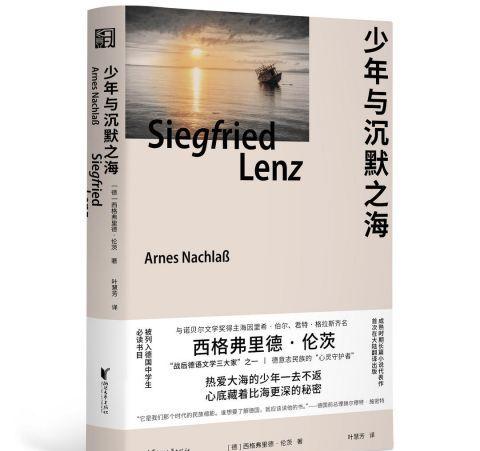Mo Yan once said: "Grasse and Lentz, their attraction to me is even greater than the attraction of Germany to me, if I can meet them, I think it will become my grand festival." And Yu Hua also told an interesting story about "stealing books": he borrowed a copy of Lenz's "German Lesson" from the library, because he did not want to lose it after reading it, he lied that he had lost the book, and paid a fine of three times the price of the book, so that he could always take it with him. After the film of the same name of "German Lessons" aired, Lenz was known to more Chinese readers, but it was not enough to know the legendary writer who was more loved by the German people than Heinrich Burr and Günter Glass, two Nobel laureates in literature.
Recently, Siegfried Lenz's masterpiece of novels, "Youth and the Sea of Silence", which is known as one of the "three great masters of german literature after the war", was translated and published for the first time in the mainland. KEY- Can Be Culturally Launched, with a precious interview with Lenz and a detailed chronology at the end of the book. In a melancholy tone of remembrance, the book tells the story of a sensitive and melancholy teenager struggling to get out of his trauma, and interprets the introverted affection of Lenz to the extreme.

"The Boy and the Sea of Silence" is a masterpiece of Lentz's mature period
Lenz was born on 17 March 1926 in Luc City (present-day Ełk, Poland) in the Masurian region of East Prussia, to a family of customs officials. In 1943 he was drafted into the German Navy and served on the armored ship General Scheer. After the ship was bombed by the RAF, he was stationed in Denmark with his troops. On the eve of Germany's surrender in World War II, Lenz fled his troops and was captured by the British, becoming an interpreter for the Prisoner of War Repatriation Committee. In 1945 he was repatriated to Germany to study philosophy, English language and literature and literature at the University of Hamburg. In 1951, the young Lenz published his first novel, "There are Goshawks in the Air", which caused a sensation in the German literary scene, and the book won the René Schiller Prize in 1952 and the Lessing Prize in Hamburg in 1953 as "a unique symbol of the persecuted people of our time", and Lenz became a professional writer ever since. In 1955, After Lenz's first collection of short stories, My Little Village Is So Sentimental: The Story of Masuria, was published, 1.6 million copies were sold that year. Germany's "Pope of Literature" Marcol Lech-Lanski commented that he was "both a natural sprinter and a proven long-distance runner".
Lenz has achieved astonishing success in a variety of literary genres, with his works translated into 22 languages, sold more than 25 million copies, and adapted several works into films. He has also won more than thirty major literary awards, including the Goethe Medal of Gold, the Thomas Mann Prize for Literature, and the Lessing Prize. (He jokingly calls his most important medal "Honorary Administrator of the Ulster Locks Administrators Association.") "The Boy and the Sea of Silence" is a must-read for German high school students, and the 2013 film of the same name won three international awards, including the Günter Straker Television Award.
Professor Luo Wei of Peking University summed up Lenz's creative journey in life: "The basic themes that run through All of Lenz's works are: experiencing unfreedom, being involved in guilt and persecution, experiencing loneliness and incompetence. His early works focused on confronting Hitler's dictatorship and its aftermath, while his later works focused on human survival and morality. "The Boy and the Sea of Silence is a masterpiece of Lenz's mature period, and in this book he touches on issues with a strong universality, which can cross the times and borders and reach the reader's heart.
A book of memories, a book of fetishes
The Boy and the Sea of Silence is a novel by Lenz written in 1999, the original German translation should be "Ana's Relic", and the translated title Chinese highlights the characteristics of marine novels. The novel tells the story of a 12-year-old boy Ana in calm, restrained and sentimental words, showing the inner struggle and pain of a sensitive and delicate boy.
The novel is told in the first person that "I" am Hans, the eldest son of Ana's foster family, and although he and Ana have only been together for two short years, they have developed a deep friendship between brothers and friends. The story jumps between memory and reality, opening a month after Ana's death, and Hans is caught in memories while sorting out his belongings. As the memories unfolded, Hans became more and more into Ana's inner world.
Lenz said in the interview: "Narrative is as important to me as learning how to live. To give yourself a clear understanding of this strange and strange life, narrative is a kind of self-liberation. Narration is a better way to understand! Storytelling provides me with an opportunity to have a clearer understanding of certain troubles, certain experiences. My purpose is not to liquidate, but to be able to see through. "Many people and things are lost in time, while others shine because of the distance of time. This is the light of silence, the unspoken words no longer need to be said, all misunderstandings have disappeared, and finally what remains is the unconcealed sincerity of the bland narrative, and the long dull pain hidden in the heart. This is both the worldly heart of Lentz's pen and the imprint he left on the history of literature.
The reporter learned that this year, KEY-Can Culture will also launch Lenz's heaviest monumental work "Hometown Museum", translated by the famous German translator Zhu Liuhua.
Text/Huang Yanwen
Source/Yangtze Evening News